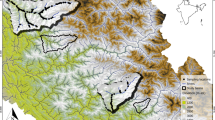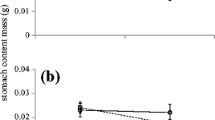Abstract
The mechanisms underlying successful invasions by a competitively subordinate species are poorly understood. In Japan, nonnative brown trout Salmo trutta L. have successfully invaded a number of streams that contain native masu salmon Oncorhynchus masou Brevoort, even though young of the year (YOY) brown trout are thought to be competitively subordinate to YOY masu salmon because of their smaller body size due to later emergence time. We conducted a laboratory experiment and field observations to evaluate whether ontogenetic habitat shifts could explain the success of brown trout. In a laboratory experiment, smaller YOY brown trout were competitively inferior to YOY masu salmon. Our field observations suggest that YOY masu salmon shift to deeper and faster velocity habitat before the emergence of brown trout fry. Thus, there is separation of habitat use between the two species. Taken together, our results suggest an ontogenetic niche shift by competitively dominant native masu salmon may reduce niche overlap and the opportunity for competitive interactions, and thus facilitate invasion by a nonnative brown trout.




Similar content being viewed by others
References
Armstrong JD, Kemp PS, Kennedy GJA, Ladle M, Milner NJ (2003) Habitat requirements of Atlantic salmon and brown trout in rivers and streams. Fish Res 62:143–170
Becker CG, Fonseca CR, Haddad CFB, Prado PI (2010) Habitat split as a cause of local population declines of amphibians with aquatic larvae. Conserv Biol 24:287–294
Bonebrake TC, Ponisio LC, Boggs CL, Ehrlich PR (2010) More than just indicators: a review of tropical butterfly ecology and conservation. Biol Conserv 143:1831–1841
Hasegawa K, Maekawa K (2006a) Effect of introduced salmonids on two native stream-dwelling salmonids through interspecific competition. J Fish Biol 68:1123–1132
Hasegawa K, Maekawa K (2006b) Effect of habitat components on competitive interaction between native white-spotted charr and introduced brown trout. J Freshw Ecol 21:475–480
Hasegawa K, Maekawa K (2009a) Distribution patterns of young of the year (YOY) native and non-native salmonid species in Mamachi Creek, Hokkaido, Japan. Jpn J Ichthyol 56:1–6 (in Japanese with English abstract)
Hasegawa K, Maekawa K (2009b) Role of visual barriers on mitigation of interspecific interference competition between native and nonnative salmonid species. Can J Zool 87:781–786
Hasegawa K, Yamamoto T, Murakami M, Maekawa K (2004) Comparison of competitive ability between native and introduced salmonids: evidence from pairwise contests. Ichthyol Res 51:191–194
Kaeriyama M (2002) Brown trout. In: The Ecological Society of Japan (eds) Handbook of alien species in Japan. Chijinsyokan, Tokyo, p 113 (in Japanese)
Korsu K, Huusko A, Muotka T (2010) Invasion of north European streams by brook trout: hostile takeover or pre-adapted habitat niche segregation? Biol Invasions 12:1363–1375
May RM (1975) Some notes on estimating the competition matrix, α1. Ecology 56:737–741
Melbourne BA, Cornell HV, Davies KF, Dugaw CJ, Elmendorf S, Freestone AL, Hall RJ, Harrison S, Hastings A, Holland M, Holyoak M, Lambrinos J, Moore K, Yokomizo H (2007) Invasion in a heterogeneous world: resistance, coexistence or hostile takeover? Ecol Lett 10:77–94
Nakano S (1995a) Competitive interactions for foraging microhabitats in a size-structured interspecific dominance hierarchy of two sympatric stream salmonids in a natural habitat. Can J Zool 73:1845–1854
Nakano S (1995b) Individual differences in resource use, growth and emigration under the influence of a dominance hierarchy in fluvial red-spotted masu salmon in a natural habitat. J Anim Ecol 64:75–84
Nakano S, Kitano S, Nakai K, Fausch KD (1998) Competitive interactions for foraging microhabitat among introduced brook charr, Salvelinus fontinalis, and native bull charr, S. confluentus, and westslope cutthroat trout, Oncorhynchus clarki lewisi, in a Montana stream. Environ Biol Fishes 52:345–355
Southward AJ, Burton RS, Coles SL, Dando PR, DeFelice R, Hoover J, Parnell PE, Yamaguchi T, Newman WA (1998) Invasion of Hawaiian shores by an Atlantic barnacle. Mar Ecol Prog Ser 165:119–126
Thurow RF (1994) Underwater methods for study of salmonids in the intermountain west. General Technical Report INT-GTR-307. US Department of Agriculture, Forest Service, Intermountain Research Station, Ogden UT
Urawa S (1995) Effects of rearing conditions on growth and mortality of juvenile chum salmon (Oncorhynchus keta) infected with Ichthyobodo necator. Can J Fish Aquat Sci 52(Suppl. 1):18–23
Urawa S, Freeman MA, Johnson SC, Jones SRM, Yokoyama H (2011) Geographical variation in spore morphology, gene sequences and host specificity of Myxobolus arcticus (Myxozoa) infecting salmonid nerve tissues. Dis Aquat Org 96:229–237
Wakabayashi T, Nakamura T, Kubota H, Maruyama T (2002) Comparison of spawning ecology of three salmonids in the inlet streams of Lake Chuzenji, central Japan. Jpn J Ichthyol 49:133–141 (in Japanese with English abstract)
Wakabayashi T, Nakamura T, Kubota H, Maruyama T (2003) Comparison of the microhabitats of two sympatric underyearling salmonids in an inlet stream of Lake Chuzenji, central Japan. Jpn J Ichthyol 50:123–130 (in Japanese with English abstract)
Acknowledgments
We thank the staff at the National Salmon Resources Center for conducting the field surveys and the experiment and S. Imai for his valuable comments during the research planning. We also thank K. A. Young and an anonymous reviewer for valuable comments on the submitted manuscript. This study was financially supported in part by Grant-in-Aids for Postdoctoral Research Fellows to KH from the Japan Society for the Promotion of Science.
Author information
Authors and Affiliations
Corresponding author
Rights and permissions
About this article
Cite this article
Hasegawa, K., Yamazaki, C., Ohkuma, K. et al. Evidence that an ontogenetic niche shift by native masu salmon facilitates invasion by nonnative brown trout. Biol Invasions 14, 2049–2056 (2012). https://doi.org/10.1007/s10530-012-0211-3
Received:
Accepted:
Published:
Issue Date:
DOI: https://doi.org/10.1007/s10530-012-0211-3




